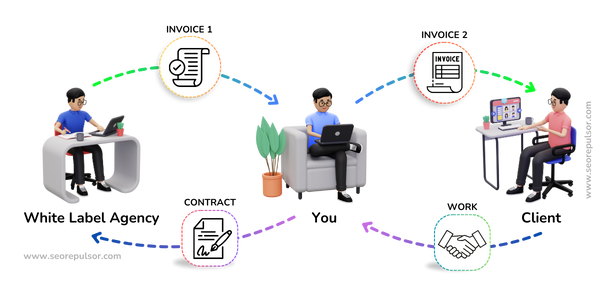White Label
What is White label?
Whitelabel is a service in which a company outsources their work to another company to complete their task or work. Essentially, the original company takes the work from the customer and transfers the work to another company or person to complete it and could earn the profit in between both parties.
Whitelabel is common across various industries, including software, consumer electronics, retail, and more. For example, a digital marketing company may take the project or work and offer it to other company to work on it and then the previous company transfers the completed work to the customer.
Overall, whitelabel can be a mutually beneficial arrangement for both the original company and the outsourced company, as it allows each to focus on their core competencies while still offering a broader range of products or services to customers.
How Does White Labeling Work?
Whitelabeling is a business practice where one company takes the customer work/project, and another company works on it and then transfers it to the company and earns the money. It’s a way for businesses to leverage existing products or services without having to find the customers them from scratch. Here’s how it typically works:

Service Agreement
The company and the white label provider enter into an agreement outlining the services to be provided, pricing, turnaround times, and other terms of the partnership.

Customization
The white label provider delivers the services with the main company branding. This means any reports, dashboards, and client communications are customized with the main company's logo, colors, and branding elements.

Service Delivery
The white label provider performs the actual work. This could involve creating and managing marketing campaigns, optimizing websites, generating content, or any other agreed-upon digital marketing services. Deliverables are sent to the main company, who then forwards them to the end clients under their own brand.

Client Management
The main company manages the client relationship, including sales, onboarding, and customer service. The clients interact with the reseller as if all services are being provided in-house.

Reporting and Analytics
Regular reports and performance analytics are produced by the white label provider but branded with the reseller’s identity. These reports help the reseller demonstrate the value and effectiveness of the services to their clients.
Advantages of White Label
White labeling offers several advantages for businesses looking to expand their product or service offerings without having to invest heavily in research, development, and branding. Some of the key advantages include:
- Resellers can offer a broader range of services without needing to hire specialists for each service.
- Enables rapid scaling of services offered to clients.
- Avoids the overhead costs associated with hiring and training an in-house team.
- Allows resellers to focus on sales and client relationships.
- Leverages the expertise and experience of the white label provider to deliver high-quality services.
- Ensures clients receive professional and effective digital marketing solutions.
- Expands the reseller’s service portfolio, enhancing their brand’s reputation and value proposition.
- Helps build client loyalty by being a one-stop-shop for various marketing needs.
Conclusion
White labeling allows digital marketing companies to offer a wide range of services without the need to develop those capabilities in-house. By partnering with a white label provider, resellers can focus on building client relationships and growing their business, while the provider handles the execution of the marketing services.

